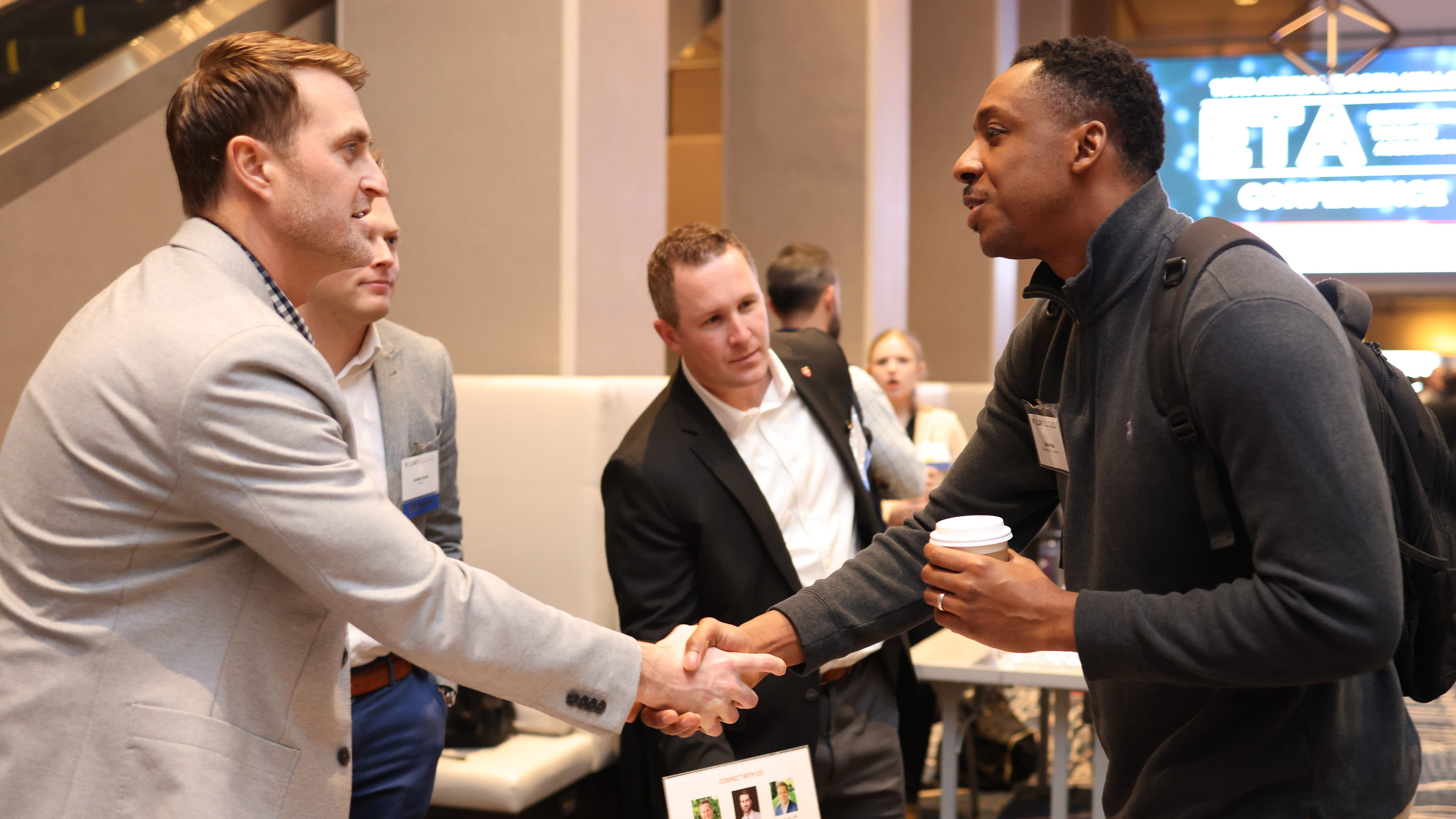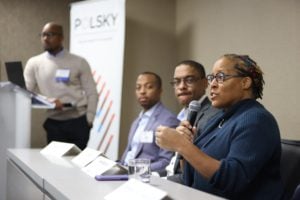Academia and Private Sector Meet at 10th Annual Entrepreneurship Through Acquisition Conference

The 10th Annual ETA Conference
The Polsky Center, in collaboration with the Chicago Booth School of Business and Northwestern Kellogg School of Management, hosted the 10th annual Booth-Kellogg Entrepreneurship Through Acquisition (ETA) Conference this week.
The conference, which is the largest ETA conference in the U.S., gathered investors, entrepreneurs, graduate students, and university faculty to share expertise and insights on the ETA ecosystem. This year’s sold-out event attracted more than 600 people, signifying the growing interest in this space.
The conference kicked off with opening remarks from Madhav Rajan, dean and George Pratt Schultz Professor of Accounting at Chicago Booth. In his remarks, he noted the importance of such events in tackling new challenges within ETA.
“In today’s economic climate, it’s imperative that we explore fresh ideas, and it is my hope that programs like today will inspire future leaders to tackle the new challenges that arise,” said Rajan. “I’m so thrilled to see this incredible turnout – a large, diverse group that represents so many parts of the ETA ecosystem.”

Graham Weaver
Following opening remarks, Rajan introduced the morning’s keynote speaker Graham Weaver, founder and managing partner of Alpine Investors and lecturer-in-management at Stanford Business. In his remarks, Weaver reflected on his more than two decades of experience as an entrepreneur and shared key learnings from his career.
“In my years of being an entrepreneur and going through that journey, these are the three most important things that I’ve learned: find something that turns you on, expand your timeframe, and beware of the two most dangerous words in entrepreneurship – not now,” said Weaver. “These are the things that world-class entrepreneurs do.”
Exploring ETA Search Options
One panel discussion titled, Exploring Search Options, delved into three of the main models of ETA: traditional search, self-funded search, and accelerator.
Moderated by Raam Jani, partner in BakerHostetler’s business group, the panel featured Hannah Barrett, director at Pacific Lake; Mark Hoffman, CEO of Larson Packaging Company; and Alejandro Renteria, co-CEO of MAS Seguros. Conversation centered on the pros and cons of the three model types.
Hoffman, who used a self-funded search model, specifically highlighted the independence and personal growth that he has experienced throughout his career as a result of taking this approach.
“I own 96% of my company, and I get to make my own decisions without having to get approval from a board or investors,” said Hoffman. “This means that I’ve had to wear many different hats in my career, which has led to tremendous personal growth. This opportunity has afforded me the opportunity to take care of my family and to live the life I want on my terms and I can’t imagine doing anything else.”
Renteria and Barret both highlighted the benefits of having invested partners who will help you succeed.
The panel also discussed what trends they’ve seen in the ETA ecosystem over the last few years, specifically calling out the growth of both interest and diversity.
“This year is tracking to be the high water mark of traditional search funds raised in a single year since the model’s inception; 2020 was the previous record, and we’ve already surpassed that,” said Barrett. “We’ve also seen more people from different walks of life getting comfortable doing something like this. More than 50 percent of people we’ve backed in the last three years come from non-traditional pre-MBA backgrounds, and more than 50 percent are women or people of color. We hope to see this trend continue in years to come.”
The State of Black ETA

The State of Black ETA Panel
Building on the growth of diversity in the ETA space, the Black Search Network hosted a panel discussion and networking opportunity titled The State of Black ETA. The session was hosted by Jason Jackson, cofounder of Black Search Network – a community of Black entrepreneurs and leaders committed to supporting each other through the lifecycle of ETA – who has attended past ETA conferences, and noted the growth that he’s experienced first-hand.
“When I attended the first conference ten years ago, there were just a few people. At that time, I knew of only five Black operators, but now to see Black investors, which was unheard of at that time, is remarkable to see,” said Jackson.
Challenges Facing the Young Operator
Catering to the large number of soon-to-be buyers attending the conference, the Challenges Facing the Young Operator panel provided in-depth conversation about some potential pain points of moving from searcher to operator.
Hosted by Scott Wilson, principal at Miles and Stockbridge, a panel of entrepreneurs who have recently made acquisitions shared their experiences.
Ian Hossfeld, CEO of City Wide Facility Solutions, called out the importance of taking some time before making big changes in your business.

Challenges Facing the Young Operator Panel
“When I first became an operator, I had a million ideas, but I needed to take some time to sit back and see the business in motion to understand the different processes and personalities,” said Hossfeld. “From that, you create a roadmap for moving forward. So, be sure to think through your actions and don’t be too hasty.”
The panel also discussed the importance of building culture at your newly acquired business. Audrey Kohout, Co-CEO of Luggage Forward, faced this challenge head on when she co-acquired her virtual business.
“We spent the first few months building our culture and establishing trust with the team,” said Kohout. “Since we’re a virtual company, we got in a car and drove around meeting our team where they were at. We wanted to show that we were excited to be there and wanted to give each of them the opportunity to showcase everything they bring to the table.”
Hereford Johnson, CEO of Therapy Group of Tucson and North Valley Pediatric Therapy, took a direct approach when he first became an operator.
“After spending time doing due diligence, you know what needs to be done. Yes, there is some confirmation that needs to be done, but there were things I knew I needed to do day one. I had a full sprint of things I did right away,” said Johnson.
The group also discussed how to prioritize issues as they come up, when to start thinking about growth, and what they would have done differently if given the opportunity.
Other panel discussions included Key People Decisions with the C-Suite, Transitioning Legacy, Strategic Capital Allocation Decisions, and Closing the Deal and Governance Strategies for Self-Funded Searches.
In Closing
The conference concluded with a discussion between keynote speaker A.J. Wasserstein, Eugene F. Williams, Jr. Lecturer in the Practice of Management at Yale School of Management, and moderator Mark Agnew, adjunct associate professor of entrepreneurship at Chicago Booth.
During the conversation, Agnew asked Wasserstein how he hopes to influence his students. He centered his answer on living a fulfilling life, something he sees as a benefit of holding on to businesses rather than selling them.

A.J. Wasserstein and Mark Agnew
“When I think about ETA and entrepreneurship, what I want my students to do is build amazing lives,” said Wasserstein. “There is such a focus on money and wealth generation, but the truth is that there are so many more fulfilling parts of ETA that come after you’ve held on to your business for a number of years.”
“Seeing your business succeed gives you a sense of esteem, building a great culture gives you a sense of belonging, watching your employees grow and develop to accomplish things you didn’t know were possible makes you proud,” Wasserstein continued. “These are things that I want all of you to experience, but you need to hold on to your business to experience them.”
Following the discussion, Wasserstein provided closing remarks in which he shared his key pieces of advice to the audience, including mapping out what you want your life to look like and chasing it as energetically as possible. He also noted that the best time to start an ETA project is now, reminded the audience to not forget about friends, family, and spirituality, and not to deify successful entrepreneurs because they are just like you – the only difference is they took the first step in a long and ambiguous adventure.
And his final piece of advice for the entrepreneurs in the audience:
“You can do this!”
Article by Darwin Minnis, associate director of media relations and external communications at the Polsky Center. Darwin has a passion for telling the stories of the people, products, and companies that are making a positive impact on their communities. Reach Darwin via email.